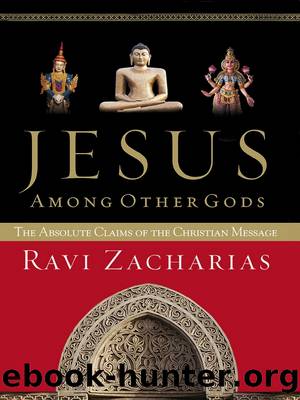Jesus Among Other Gods by Ravi Zacharias

Author:Ravi Zacharias
Language: eng
Format: epub
Tags: ebook, book
Publisher: Thomas Nelson
Published: 2012-01-09T00:00:00+00:00
TRANSLATING INTO LIFE
In the practice of the Christian faith, this sharing of the bread and of the cup has been aptly called Communion. God has come near, and we enjoy the indwelling of His presence in us. The contrast here from every other faith is as diametric as one can imagine.
Hinduism at its heart and in its goals teaches us that we are to seek union with the divine. Why union? Because the Hindu claims that we are part and parcel of this divine universe. The goal of the individual is, therefore, to discover that divinity and live it out.
Listen again to the words of Deepak Chopra on this purpose of life. He makes this assertion in the early part of his book: âIn reality, we are divinity in disguise, and the gods and goddesses in embryo that are contained within us seek to be fully materialized. True success is therefore the experience of the miraculous. It is the unfolding of the divinity within us.â6
Later in his book, Chopra makes a statement that forms the basis of his philosophy: âWe must find out for ourselves that inside us is a god or goddess in embryo that wants to be born so that we can express our divinity.â7
I cannot resist asking, Who are the we? Who is the god? Who is the self? Are these different entities with which we are cohabiting? Is there a god who needs me (which me?) to bring him (which him, if it is actually me?) to birth so that my deluded self will cease to be deluded and will emerge divine as the real self? How did this god end up in embryonic form while I became full grown, so that I will give him the privilege of birth and lose my humanity to find my divinity? At the risk of being frivolous, this is the ultimate version of âWhoâs on first.â
Toward the end of his book, Chopra asks us to make a commitment to the beliefs he has espoused in these words:
Today I will lovingly nurture the god or goddess in embryo that lies deep within my soul. I will pay attention to the spirit within me that animates both my body and my mind. I will awaken myself to this deep stillness within my heart. I will carry the consciousness of timeless, eternal Being in the midst of time-bound experience.8
This is the heart of philosophical Hinduismâself-deification. One of Indiaâs premier philosophers stated as forthrightly as one could, âMan is God in a temporary state of self-forgetfulness.â
How can it be that we are the outworking of the quantum world but at the same time, gods? Is this what a few thousand years of human history have taught us? We are lonely and confused gods who have lost our way? This is the reason the âyouâ disappears in Hinduism and the meditative process is enjoined, so that we can as individuals merge with the one impersonal absoluteâthe capital âI,â because there is no significant other.9
Union with the impersonal absolute defies language, reason, and existential realities.
Download
This site does not store any files on its server. We only index and link to content provided by other sites. Please contact the content providers to delete copyright contents if any and email us, we'll remove relevant links or contents immediately.
The Five People You Meet in Heaven by Mitch Albom(3549)
The Secret Power of Speaking God's Word by Joyce Meyer(3154)
Real Sex by Lauren F. Winner(3002)
Name Book, The: Over 10,000 Names--Their Meanings, Origins, and Spiritual Significance by Astoria Dorothy(2967)
The Holy Spirit by Billy Graham(2938)
0041152001443424520 .pdf by Unknown(2842)
How The Mind Works by Steven Pinker(2811)
ESV Study Bible by Crossway(2772)
Ancient Worlds by Michael Scott(2673)
Churchill by Paul Johnson(2576)
The Meaning of the Library by unknow(2561)
The ESV Study Bible by Crossway Bibles(2546)
The Gnostic Gospels by Pagels Elaine(2517)
MOSES THE EGYPTIAN by Jan Assmann(2410)
Jesus by Paul Johnson(2349)
City of Stairs by Robert Jackson Bennett(2337)
The Complete Dead Sea Scrolls in English (7th Edition) (Penguin Classics) by Geza Vermes(2269)
The Nativity by Geza Vermes(2221)
Ancient Near Eastern Thought and the Old Testament by John H. Walton(2219)
